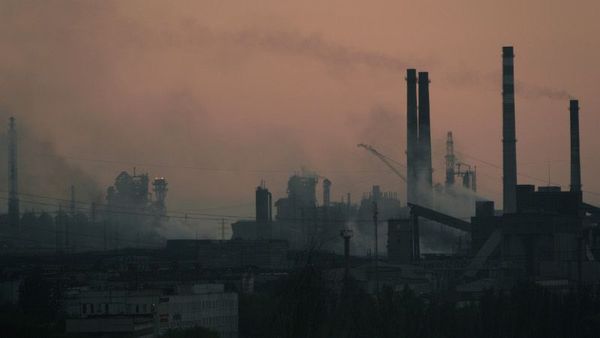Eye For Film >> Movies >> Almost Holy (2015) Film Review

Nostalgia is a funny thing. Old people, Gennadiy tells us, often complain that everything was better in the Soviet days. He just misses the cartoons. One in particular, about a crocodile who shared his name, may have been a formative influence. "All time he save somebody," says Gennadiy wistfully. It's something that has come to mean more as Ukraine has struggled with its independence and it has become all too apparent that the authorities are failing to save all those who need them.
The ones who really tug on Gennadiy's heartstrings are the children. That's why he has set up the Pilgrim Centre to get them off the streets and off drugs. The problem is, a lot of them don't want to be saved. So he goes out at night, with his van, with his helpers, and he takes them into his custody whether they like it or not.

Gennadiy is a pastor, not a police officer. He's acting in blatant violation of the law. Curiously, Steve Hoover's documentary shows us little in the way of official reaction to this - perhaps there hasn't been much. The media certainly reacts, inviting viewers to think about the difficult ethical questions his actions raise. Inevitably, some of the children run away, back to the streets and the only freedom they've ever known. Gennadiy uses his natural charisma to try and win over both them and the press. He also gets involved in a campaign to stop pharmacies illegally selling opiates to children, an easy way to win popularity (and probably also heartfelt, but some of the placards carried by his supporters (sadly not subtitled) illustrate the dangerously simplistic thinking that attracts them to this campaign - they simply want opiates banned, with no acknowledgement that, properly controlled, they have a vital role in medicine. Shrewder, Gennadiy knows how to play public opinion to get the support he needs.
Are his actions and manipulations justified? It's difficult to watch this film with out concluding that he has rescued a large number of children from destitution, and probably from death. He tries to get them young, he explains, before they have contracted HIV. There are disturbing scenes involving a desperately ill man who wants Pilgrim to buy him anti-retroviral drugs. Gennadiy's refusal seems heartless but he has a point - he is essentially running a system of triage and the surviving children need that money to help them stay on a path that will save them from such a fate. He makes sure they see everything that happens afterwards. It's a brutal lesson but a necessary one.
What kind of person takes on this work? Reference is made to criticism recorded on Wikipedia - claims that Gennadiy is egotistical and only interested in self-aggrandisement. The former allegation rings true, but should it matter? Virtually every successful social activist is accused of this at some point, yet no-one suggests a better way of getting things done when the state fails. What's clear is that Gennadiy is working hard, continually, for little material gain. More interesting is the observation that he is himself the son of alcoholics. Perhaps this is his way of trying to help the child he once was.
There are many ways of interpreting the events depicted here. The background of desperation is palpable. As the film was shot over a number of years and embellished with archive footage, we also see the impact of Maidan and of Russia's gradual incursions from the east. Gennadiy is sad but sanguine. His work puts the war into perspective, makes it seem almost trivial, but some of the young people he has helped lack that insight. After saving them from the streets, will he lose them to the conflict?
In the midst of this struggle come moments of extraordinary beauty. Terrence Malick was an executive producer and some shots recall his work, capturing Ukraine's wide, flat rural landscapes in the long light of evening. It matters that we understand why people love this place, why they feel a loyalty to it in spite of everything. On the surface, Almost Holy is a deliberately troubling portrait of a complex individual. Underneath is a portrait of a nation fighting for its future.
Reviewed on: 13 May 2016
















